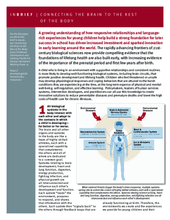Displaying 571 - 580 of 2221
This paper chronicles the goals of the partnership and the planning and implementation of the Child Protection Training Academy, developed by the Illinois Department of Children and Family Services and the University of Illinois Springfield in the U.S.
This study sought to better understand the network characteristics of homeless young adults with a history of foster care.
Because social networks have been shown to impact behavioral health outcomes, this study sought to better understand the network characteristics of homeless young adults with a history of foster care.
The goal of this study is to identify predicative indicators that will assist in the development of a home study that will increase consistency within home studies and decrease timeliness of completion.
A mixed method correlational exploratory pilot was conducted in Washington State to determine items within the home study assessment that could be used as indicators to identify baseline requirements of the assessment and suggest anticipated depth (expansion or reduction) within the required topic(s).
This study extends our understanding of use of failure to protect (FTP), a sub-type of neglect, by examining who workers substantiate for FTP, in what context, and the justifications they use.
This brief describes some of the "compelling evidence that the foundations of lifelong health" are built in the early years of life, "with increasing evidence of the importance of the prenatal period and first few years after birth."
This paper explores how college graduates with foster care histories fare after graduating from a 4-year college that offered a campus-based program.
This study selected children who remained in kinship care (N = 267) for three waves from nationally representative data and examined the longitudinal associations among poverty, economic pressure, financial assistance, and children’s behavioral health outcomes in kinship care.
A U.S. couple who gained popularity on social media, including through documenting their adoption of a child from China on their YouTube channel, "are facing a backlash after they revealed he had been placed with another family," according to this article from BBC News.

